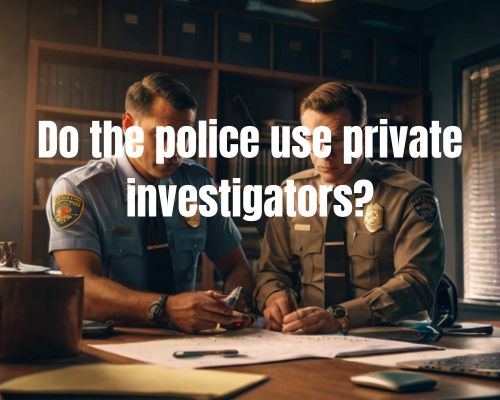Private investigators like Charles Jimerson from Private Investigator West Palm Beach, often depicted as lone wolves, actually collaborate with police forces more than you might think.
Police use private investigators to bridge gaps that their official protocols and resource constraints may create.

These professionals can gather information and conduct surveillance in ways that augment police work without overstepping legal boundaries.
You might wonder why law enforcement would turn to external help when they typically have extensive resources at their disposal.
The reality is, private investigators can be invaluable in certain scenarios where specialized skills or additional manpower are needed.
For instance, they can operate in more flexible ways, filling in when the police have legal or logistical limits.
Moreover, the relationship between police and private investigators can be mutually beneficial.
Police detectives may find that having an extra set of experienced eyes and ears not only accelerates investigations but also enhances the quality of evidence gathered.
This collaboration allows each party to leverage their unique strengths for more effective outcomes.
Role of Private Investigators in Legal and Police Frameworks
Private investigators often play a critical role alongside legal and police frameworks.
Despite their different objectives and boundaries, their expertise and services can complement law enforcement efforts in specific situations.
Distinction Between Police Officers and Private Investigators
Police officers are law enforcement agents with the authority to enforce laws, carry firearms, and make arrests. They work within a public framework, ensuring public safety and order.
In contrast, private investigators work for private clients including individuals and businesses.
- Private investigators do not have arrest powers.
- They must maintain a license and operate under strict regulations.
- Their primary role is to gather information legally.
These distinctions highlight the substantial differences in authority and accountability between the two.
Legal Boundaries and Ethical Considerations
Private investigators operate under strict legal boundaries. They must respect privacy laws and cannot engage in activities such as wiretapping or hacking without the proper consent.
- Trespassing: PIs cannot enter private property without permission.
- Surveillance: They may conduct surveillance in public places but must avoid harassment.
- Firearms and Force: While some states allow PIs to carry firearms, restrictions apply.
Legal and ethical considerations are paramount to avoid infringing on privacy rights and breaking laws.
Collaborations between Law Enforcement and Private Investigators
Occasionally, private investigators like Charles Jimerson from Private Investigator West Palm Beach collaborate with police to provide additional resources or specialized skills.
This cooperation must adhere to legal parameters and ensure mutual respect for jurisdictions.
- Police may hire private investigators for specific research tasks.
- PIs can assist in locating missing persons or gathering information on suspects.
- Both parties must ensure that collaborations do not compromise legal integrity.
These partnerships can enhance the efficiency and scope of investigations by leveraging diverse expertise.
Investigative Techniques and Technologies
This section explores the various investigative techniques and technologies used by police and private investigators.
Key areas include surveillance methods, evidence gathering, and digital investigations.
Surveillance Methods and Tools
Surveillance is a cornerstone of investigative work.
Private detectives and police often conduct surveillance using an array of tools.
CCTV cameras, GPS tracking, and spy gear like hidden cameras are commonly employed to monitor and gather information on subjects.
Stakeouts are a traditional and essential technique where investigators physically surveil individuals.
Using discreet vehicles or hidden locations, they monitor subjects for long periods, capturing photos or video evidence.
Drones have also become popular, offering high-quality aerial views without the need for a human presence.
When combined with skills in impersonation and local laws, these methods help ensure the collection of legally admissible evidence.
Gathering Evidence and Intelligence
Gathering evidence and intelligence is crucial for building a case.
Police and private investigators use various methods to collect data.
Field interviews, covert observations, and background checks are standard practices.
Investigators may record audio conversations or take photos to document activities.
Financial information, assets, and criminal records can be assessed through meticulous searches of public records and databases.
Social media investigations are expanding, as platforms like Facebook and Instagram can reveal a wealth of information.
Social media profiles can be scrutinized for connections, behaviors, and locations, although private accounts present challenges.
Digital and Cyber-Investigations
The digital realm has revolutionized investigations. Today, digital forensics and cyber-investigations are indispensable.
Investigators analyze computer systems, internet activity, and phone records to uncover vital clues.
Email trails, browsing history, and social media interactions often expose critical evidence in cases.
Moreover, hacking into private accounts or systems remains illegal and unethical. Therefore, authorized access through proper channels is paramount to maintaining privacy standards.
Professional investigators receive education and training to operate sophisticated technologies and software.
By focusing on ethical and lawful methods, they ensure the reliability and integrity of their findings.